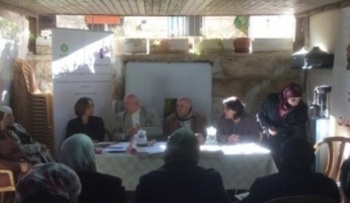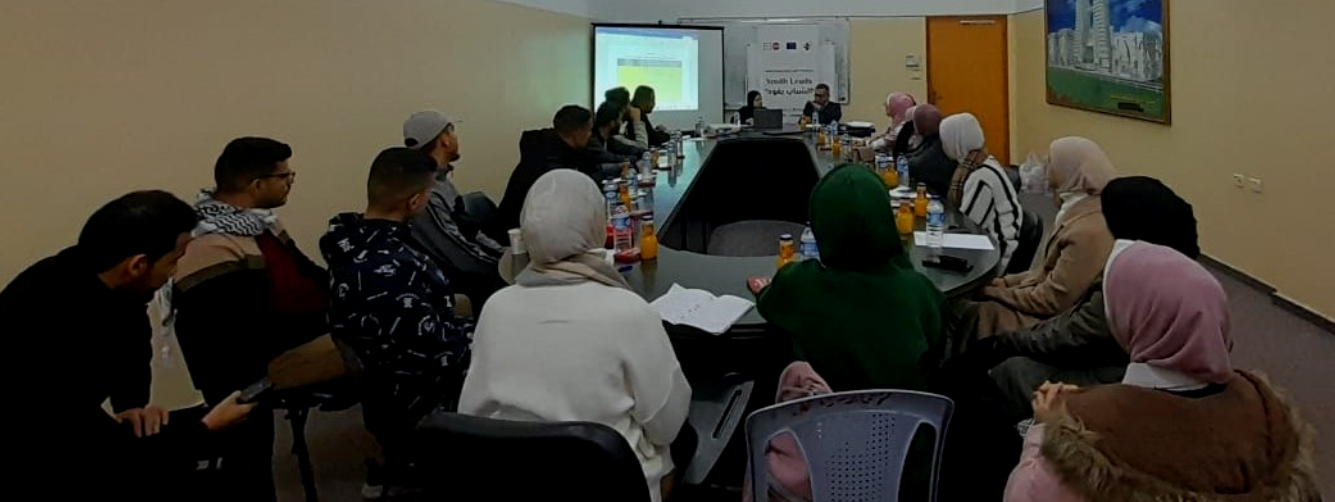
Ramallah – Dozens of Jerusalemite women from grassroots organizations in the city convened in the Women's Forum of Sheikh Jarrah to perceive the efforts extended so far by the National Coalition for Implementing UNSCR 1325 as well as the planned initiatives that aim to employ UNSCRs that promote Women, Peace and Security Agenda (WPSA) at the national/local levels. Discussions focused on the documentation tool; that aim to document Israeli occupation violations of human rights against Palestinian women in general and in Jerusalem in particular. This tool aims to produce evidence-based reports for advocacy purposes both at the national, regional and international levels.
Guest speakers comprise media specialist, Rasem Obeidat, women’s activists Fadwa Khader and Najwa Odeh, Director of the Jerusalem Center for Social and Economic Rights, Ziad Hammouri, in addition to Amal Qassem, The Director of Women's Forum of Sheikh Jarrah.
In the meeting that was organized by MIFTAH in cooperation with grassroots organizations and members in the Local Coalition for Implementing UNSCR 1325. The Local Coalition was founded by MIFTAH in 2014 in close partnership with OXFAM during the implementation of the project "Towards Institutionalizing UNSCR 1325 to promote Palestinian women, peace and security agenda". Participants agreed that the institutionalization of women’s political actions and converting Palestinian feminist movement into civil society institutions has been frustrating to many, thus prompting them to rework the basis and priorities of women’s agenda. Furthermore, the political split has led to re-repeat another “Palestinian Nakba”. The fact that decision makers are so preoccupied with this issue has given the Israeli occupation more opportunities to be intransigent and oppressive towards Jerusalemites. Hence, one of the recommendations of the meeting was for serious efforts to achieve reconciliation with an emphasis on the need to involve the various women committees.
Women participants asserted that they have deepened their knowledge of the mechanisms for implementing UNSCR 1325 given their participation in meetings, workshops and trainings on documenting Gender-based Violence. They were also in consensus over the need for concrete efforts from institutions and popular activities in Jerusalem towards empowering the role of women and Jerusalem residents since they are targeted by the Israeli occupation and settlers, especially in the Sheikh Jarrah neighborhood. Furthermore, the women agreed that there could be no talk of development without first addressing the issue of women’s political participation, adding that the level of women's participation positively reflects on development policies.
The participants reiterated the importance of broadening the platform of legitimacy for representatives and executive institutions in the political system, which grant them democratic representative powers and unique political participation.
The participants told their stories – of killings, attacks on women, violations of their rights, arrests, deportations, fines, house arrests and of incarcerated husbands and sons. They then highlighted the importance of the survey that was conducted by MIFTAH through partner grassroots organizations at the end of 2014. The survey focused on monitoring violations against Jerusalemite women in Sheikh Jarrah, Wadi Joz, Ras Al Amoud, the Old City, Essawiyeh and Shufat.
One participant said that the political developments and their repercussions on the economic situation under the Israeli occupation had drained women and largely contributed to their reluctance towards participating in politics. This, participants said, was why women’s participation in political life needs to be revived.
Main pillars
Obeidat gave a historical background on how the political, social and service bodies were formed through the Women's Union since 1923. Between 1948 and 1967, women movement took on a more political form under the guise of social and service work. Obeidat pointed to the period in which the General Union of Palestinian Women was formed and its activism in the field as the women's official arm of the PLO. He highlighted the prominent role Palestinian women achieved in the first Intifada through participating alongside men in the various forms of political struggle and resistance.
Obeidat attributes the current lack of political participation by both women and men to several factors including the overall frustrating situation in Palestinian society resulting from regional and local conflicts and from the internal split, in addition to the negligent state of political factions. He also highlighted the laws and legislation that discriminate against women in addition to the lack of plans and programs designed for them.
Prominent political resistance role
Social activists Fadwa Khader and Najwa Odeh highlighted the prominent role in politics and in the resistance that Palestinian women played alongside men. They also said that in spite of the political role women played in Gaza and the West Bank to achieve reconciliation, this has not given them the opportunity for real participation in the decision-making process and participation in the special negotiations and reconciliation committees. They also emphasized that male domination was prevalent in religious and secular parties alike.
Daily violations by the occupation
Ziad Hammouri, The Head of the Jerusalem Center for Social and Economic Rights, underlined the impact of the daily Israeli violations on women’s political participation, stressing that there is a clear shortcoming in formulating policies that aim at involving women in the decision-making process.
Institutionalizing women’s popular activities
Amal Qassem, Jerusalem activists and head of the board of directors for the Women’s Forum of Sheikh Jarrah, gave a snapshot of the Palestinian women’s participation in the struggle during the first Intifada when women’s popular activities were institutionalized within popular frameworks in civil society. This largely contributed to their isolation from political participation in the factions they belonged to. Furthermore, their traditional role in social and charitable work and health care was reinforced through the establishment and administration of daycares, collecting donations , visiting the wounded, etc. However, after the inception of the PA, these institutions and bodies diminished, women cadres were integrated, and they ultimately shifted towards government work.
Qassem posed an inquiry about the role of the Ministry of Women’s Affairs in supporting women organizations in Jerusalem, stressing on the need to rework the women’s agenda towards forming lobbying campaigns and initiatives. She maintained that women’s political activism must be distanced from civil society institutions through which women’s political action was institutionalized and took on another form.
This activity is part of a series of meetings organized by MIFTAH in the northern and central districts to discuss issues regarding Palestinian women and girls security in light of the dual violence endured on them – violence that is not eradicated neither by Palestinian laws or legislations nor by civil society services.







